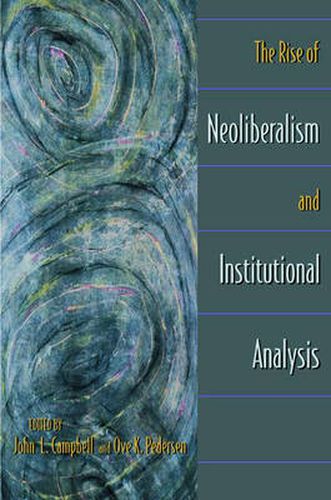Readings Newsletter
Become a Readings Member to make your shopping experience even easier.
Sign in or sign up for free!
You’re not far away from qualifying for FREE standard shipping within Australia
You’ve qualified for FREE standard shipping within Australia
The cart is loading…






The last quarter century has been marked by the ascension of neoliberalism - market deregulation, state decentralization, and reduced political intervention in national economies. Not coincidentally, this period of dramatic institutional change has also seen the emergence of several schools of institutional analysis. Though these schools cut across disciplines, they have remained isolated from and critical of each other. This volume brings together four - rational choice, organizational, historical, and discursive institutionalism - to examine the rise of neoliberalism. In doing so, it makes tremendous methodological strides while substantively enlarging our knowledge about neoliberalism. The book comprises original empirical studies by top scholars from each school of analysis. They examine neoliberalism’s rise on three continents and explore changes in macroeconomic policy, labor markets, taxation, banking, and health care. Neoliberalism appears as much more complex, diverse, and contested than is often appreciated. The authors find that there is no convergence toward a common set of neoliberal institutions; that neoliberalism does not incapacitate states; and that neoliberal reform does not necessarily yield greater efficiency than other institutional arrangements. Beyond these important empirical contributions, this book is a methodological milestone in that it compares different schools of institutionalist analysis by seeing how they tackle a common problem. It reveals a second movement within institutionalism - one toward rapprochement and cross-fertilization among paradigms - and explains how this might be furthered with benefits throughout the social sciences. In addition to the editors, the contributors are Sarah L. Babb, Ellen M. Bradburn, Bruce G. Carruthers, Terence C. Halliday, Colin Hay, Edgar Kiser, Peter Kjaer, Jack Knight, Aaron Matthew Laing, David Strang, and Bruce Western.
$9.00 standard shipping within Australia
FREE standard shipping within Australia for orders over $100.00
Express & International shipping calculated at checkout
The last quarter century has been marked by the ascension of neoliberalism - market deregulation, state decentralization, and reduced political intervention in national economies. Not coincidentally, this period of dramatic institutional change has also seen the emergence of several schools of institutional analysis. Though these schools cut across disciplines, they have remained isolated from and critical of each other. This volume brings together four - rational choice, organizational, historical, and discursive institutionalism - to examine the rise of neoliberalism. In doing so, it makes tremendous methodological strides while substantively enlarging our knowledge about neoliberalism. The book comprises original empirical studies by top scholars from each school of analysis. They examine neoliberalism’s rise on three continents and explore changes in macroeconomic policy, labor markets, taxation, banking, and health care. Neoliberalism appears as much more complex, diverse, and contested than is often appreciated. The authors find that there is no convergence toward a common set of neoliberal institutions; that neoliberalism does not incapacitate states; and that neoliberal reform does not necessarily yield greater efficiency than other institutional arrangements. Beyond these important empirical contributions, this book is a methodological milestone in that it compares different schools of institutionalist analysis by seeing how they tackle a common problem. It reveals a second movement within institutionalism - one toward rapprochement and cross-fertilization among paradigms - and explains how this might be furthered with benefits throughout the social sciences. In addition to the editors, the contributors are Sarah L. Babb, Ellen M. Bradburn, Bruce G. Carruthers, Terence C. Halliday, Colin Hay, Edgar Kiser, Peter Kjaer, Jack Knight, Aaron Matthew Laing, David Strang, and Bruce Western.